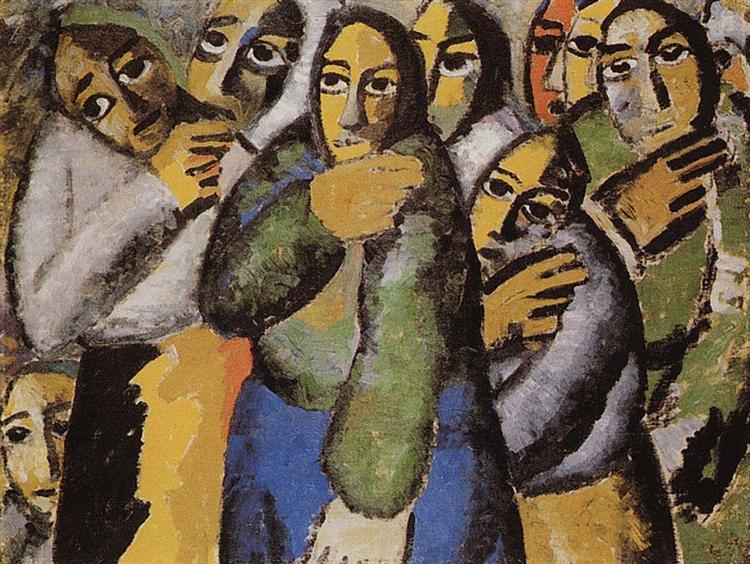Description
Kazimir Malevich, a figure of great relevance in the Russian avant -garde, offers us in his work "peasant women in a church" (1912) a window rich in meanings and a complex relationship between form and spirituality. This piece, located at a crucial moment of its artistic evolution, is a valuable testimony about the author's pictorial and social concerns.
The painting portrays a group of peasant women within what appears to be a church, a scenario that immediately links the everyday and the sacred. The figures, carefully articulated, are dressed in traditional costumes, which stand out for their vibrant colors and simple geometric shapes. This use of color and the shape points to the Malevich cube-fouturist phase, where the decomposition and abstraction of the forms are manifest.
What captures attention is immediately the juxtaposition between human forms and architectural space. The Church, although barely outlined, acts as a backdrop that seems to raise peasant figures to an almost iconic level. Malevich uses color blocks and defined lines to give life to women's clothes and faces, capturing both their materiality and their emotional inaccessibility, which is characteristic of their work during this period.
The use of color in painting is also remarkable for its audacity and its symbolic intention. The tones of red, blue and black create a dramatic contrast that suggests not only social and economic differentiation but also a psychological depth. The colors not only adorn the figures; They also seem loaded with a subtle symbolism, perhaps pointing to the hardness of peasant life and the hope of spiritual redemption.
It is crucial to emphasize that this piece arises in a context where Malevich had not yet entered the suprematism, a style that would be the culmination of its search for a purely abstract and spiritual art form. Therefore, "peasant women in a church" can be seen as an intermediate phase, where the tension between realistic representation and abstract aspiration is in full flowering.
The work can also be interpreted as a social comment. In the Russia of the early twentieth century, the peasants were often the bearers of customs and traditional life, and by placing them in a sacred environment, Malevich claims their importance both in the social and spiritual fabric. The act of putting these women at the center of their composition reinforces the sacredness of the mundane, a recurring theme in their work.
In summary, "peasant women in a church" constitutes a key piece to understand Malevich's transition towards its most abstract and theoretical style. His ability to mix the earthly and the spiritual, the realistic and the abstract, makes this work a sublime example of his artistic genius. Painting is not only a visual document of a specific time and place, but also a lasting testimony of Malevich's ability to capture the spiritual and social complexities of its time.
KUADROS ©, a famous paint on your wall.
Hand-made oil painting reproductions, with the quality of professional artists and the distinctive seal of KUADROS ©.
Art reproduction service with satisfaction guarantee. If you are not completely satisfied with the replica of your painting, we refund your money 100%.

